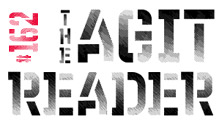
Velvet Hammer
Simple Machines, 1993
There was never much distinction in my mind between Columbus’ Scrawl and bands like The Blake Babies, Dinosaur Jr. and the Volcano Suns. They all occupied places on the scruffy indie-rock spectrum of the late ’80s, and the fact that Scrawl happened to reside in my hometown, had little bearing on my opinion one way or the other. Not being of drinking age in those days, there was little opportunity to see those bands live so they only existed on the level plane of my turntable.
Still, with the release of Velvet Hammer in 1993, there was a shift, and I began to take the trio more seriously. Indeed, the Steve Albini–produced album is a serious record. The band had always applied a Midwest accent, as well as a certain dryness characteristic of that middle section of the country, to their lean go at a kind of ragtag post-punk. But assisted by Albini, the three-piece—guitarist Marcy Mays, bassist Sue Harshe, and new (at the time) drummer Dana Marshall—created a small masterpiece that was severe in both sound and content.
This kind of intent is obvious from note one, with the band carving out a tale of familial dysfunction out of hotwired guitar, thudding bassnotes and cracking drumbeats on “Your Mother Wants to Know.” In lesser hands, such treacherous subject matter would no doubt come off sappy, but here there’s no room for tears or sentimentality. Hell, listening it feels like there’s barely enough oxygen in the room for Mays to belt out the track’s refrain of “tell her anything.”
Conversely, “Face Down” is more about the release than the tension in restraint. The song goes down a path of dual-vocal switchbacks before reaching a howling apex. Here, as elsewhere, Albini’s engineering accents the contrasts. Lyrically, the album is just as arid; imagine if Sinclair Lewis wrote records dealing with domestic volatility instead of novels on small town life. The album gets a little more wily on “Drunken Fool,” where Mays sings about trying to escape all the turmoil over a chug of bass and Harshe’s backing vocals. Better yet is “Prize,” a lyrical tug-and-pull that finds Mays dissecting the ups and down of her relationship over an equally propulsive mix of guitar jangle and big beats.
The quieter moments on the album—“Tell Me Now, Boy” and “Blue Green Sea”—are just as poignant while avoiding cheap emotional manipulation. That was always Scrawl’s greatest attribute: the honesty in their approach, which no doubt is why their subsequent business relationship with major label Elektra was probably doomed from the outset. Whatever, at that point, it was icing on the cake as Velvet Hammer is the kind of album most bands hope to achieve just once.
Stephen Slaybaugh
PAST PERFECTS
Bobb Trimble, Crippled Dog Band
Iggy Pop, Roadkill Rising... The Bootleg Collection 1977-2009
Archers of Loaf, Icky Mettle
Culture, Two Sevens Clash
The 3Ds, Early Recordings 1989-90
Stone Coal White, Stone Coal White
Father's Children, Who's Gonna Save the World
Paul McCartney, McCartney and McCartney II
Peter Tosh, Legalize It and Equal Rights
Sebadoh, Bakesale
Love, Black Beauty
Reatards, Teenage Hate
DOA, Something Better Change and Hardcore 81
Simple Minds, Sparkle in the Rain
